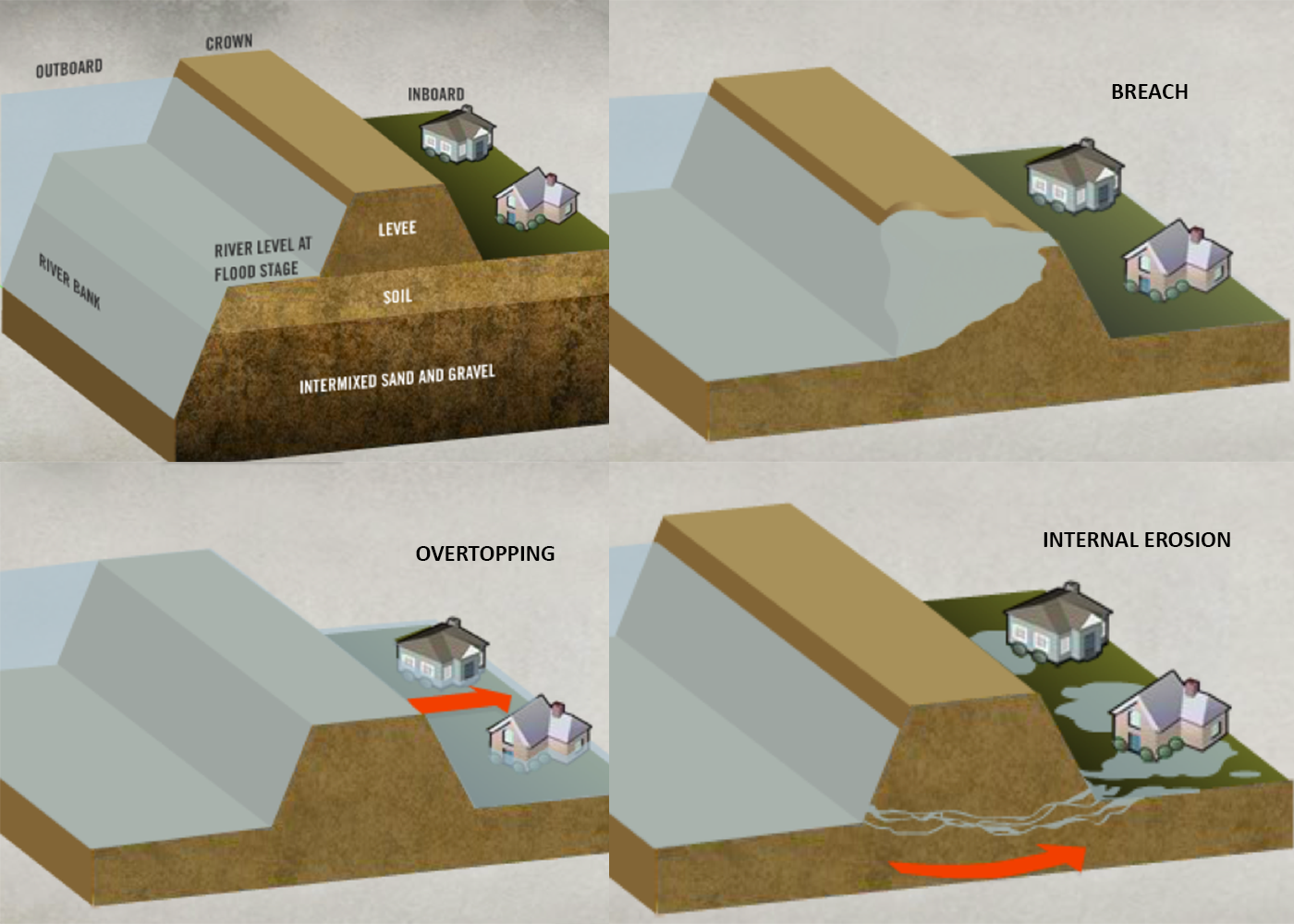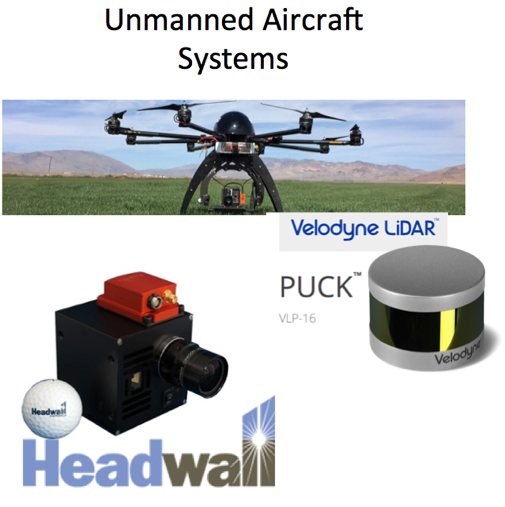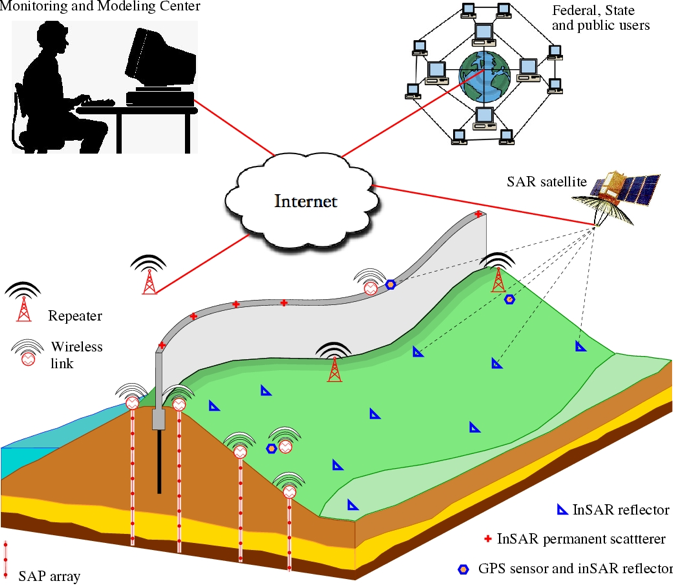IRIS: Intelligent Resilient Infrastructure Systems
Program Sponsor
The IRIS initiative is funded by Vanderbilt Trans-Institutional Programs (TIPs).
Background and Motivation
- The nation’s civil infrastructure is aging and in poor health: ASCE Civil Infrastructure Grade: D+ (Dams: D; Levees: D-)
- Infrastructure protection systems are exposed to more natural disturbances (e.g., hurricanes, tsunamis, drought-flood cycles) with ever increasing severity, as a consequence of climate change.
- Flood protection systems (e.g., levees and dams) are especially vulnerable to climate change induced natural disasters.
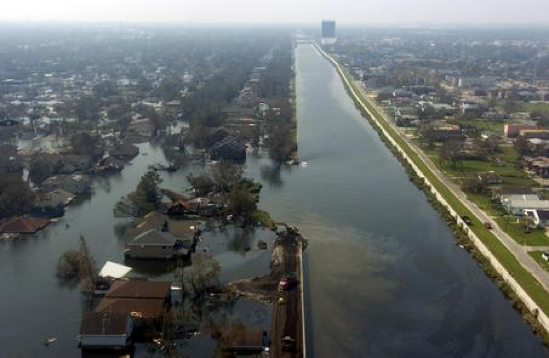
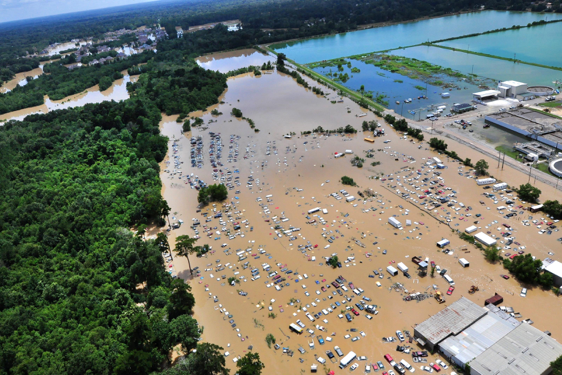
Vision and Approach
Vision
Intelligent and resilient systems that organically interact (i.e., inform as well as adapt to demands) with local communities and decision makers in order to function efficiently and effectively.
Make Vanderbilt a hub for intelligent resilient infrastructure systems research and education innovation with emphasis on flood protection systems (FPS) such as levees, earthen- and concrete dams.
Research Approach
A fully integrated, multi-disciplinary, cyber-physical systems strategy to effectively monitor FPS health and inform actionable information to decision makers. 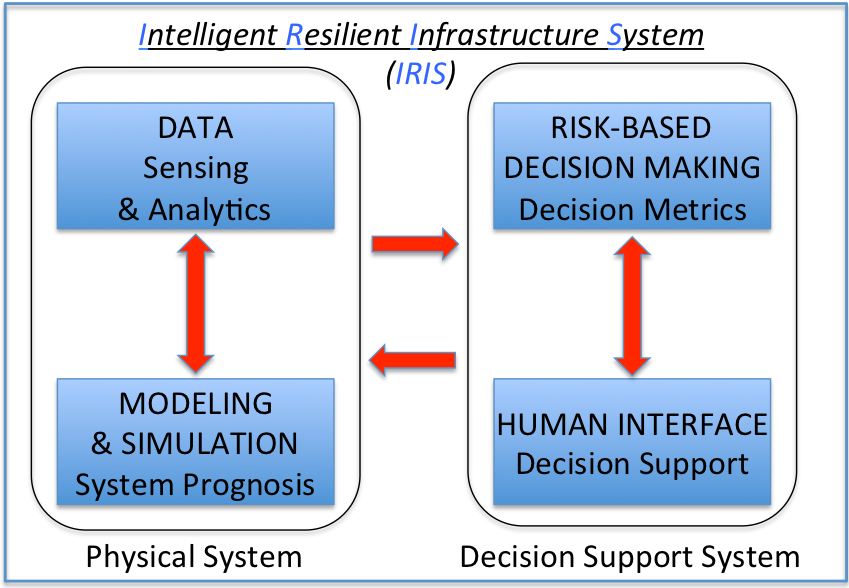
Core Team

Physical System
- The project will enable smart resilient infrastructure systems that use a data (sensor)-driven and model-based approach to effectively manage and enhance resiliency.
- Data-driven diagnostics and model driven prognostics for infrastructure resilience.
- A FPS test-bed for IRIS: Levees
- Significant government focus on improvement of levee safety
- Many flooding disasters are linked to levee breaches
- Levees protect 43% of US population from flooding
Physical Modeling of FPSs
- Multiphysics modeling of structural deficiency: coupled seepage (i.e., fluid flow) and deformation.
- Multiscale modeling and characterization of failure:
- Contributions to failure from different scales – variational multiscale enrichment method
- Identification of physical health indicators as a function of load and environment history.
- Prediction of time evolution of health.
- Physical model update as a function of local and remote measurements.
Remote Sensing and Monitoring of FPSs
- Unmanned Aircraft Systems (UAS) allow for routine monitoring of FPS at low cost.
- Combination of hyperspectral imaging and Lidar observations allows for a detection of minute changes in FPS elevation or structure.
- While not necessarily related to acute structural failure, these observations will provide important information to update physical models and help identify critical areas that might require closer monitoring.
Decision Support System
Risk-Based Decision Making
- For a set of FPS disruption scenarios, we are developing methodologies to assess:
- Human casualties
- Physical damage
- Loss of use
- Community disruption
- Regional, national, and international impacts
- Anticipated benefits:
- Identification of a suite of disaster scenarios associated with FPS vulnerability/resilience.
- Process for identifying FPS “hot spots” for installing sensors
- Method for evaluating the cost-effectiveness of various risk mitigation strategies.
- Establishing interdependence relationship within and across infrastructures before, during, and after the disruption.
- Opportunity to make the business case for investing in FPS resilience.
Human Decision Support Interface
- We are building a decision support interface that allows the user to:
- Easily consider each strategic alternative.
- Update strategies.
- Explain the resulting alternatives to individuals with different risk preferences and perspectives on critical factors.
The development of all aspects related to the decision support system is therefore dependent on direct engagement with potential users and delivery of information in a natural and visual manner.
Numerous factors (experience and bias) influence the quality and speed of decisions made by decision-makers, experts, and non-experts alike.
The user must be able to easily understand the current situation with the FPS and how the alternative strategies will impact its future state.
- We are using a joint experimental and cognitive modeling approach to assess how such factors influence FPS decision-making.
- Experimentation provides a wealth of information about the outcomes and properties of decisions
- Cognitive modeling, which has proven useful in other fields, but has not yet been applied in this context, will allow us to assess how factors such as caution and bias influence decision quality, and how they are influenced by external factors (time pressure or experience).
Outreach and Community Engagement
Stakeholders Participation
- Understanding decision-making and decision makers:
- Local boards, local governments, mayors office, private owners
- US Army Corps of Engineers (USACE)
- Emergency responders, FEMA
- Understanding needs of local communities surrounding FPS.
Identifying Core Research Strengths at Vanderbilt
- Advisory council: Prof. Mark Cohen (Owen), Prof. Steve Buspy (Nursing), Prof. Nina Martin (Peabody) and Prof. Gabor Karsai (Engineering).
Gaining Visibility and Forming Partnerships
- Forging USACE ties, IRIS seminar series.
Research Experiences for Students
- Graduate student participation.
- Summer experiences for undergraduate students.
- K-12 outreach: Harpeth Hall students for January STEM program; Tennessee Women in Science, Technology, Engineering and Research (TWISTER) career conference; Advising school for Science and Math students.
Multidisciplinary Education
Cross-College Education
- We are investing in merging fundamental ideas concerning human judgment, decision-making, and software-based decision support to develop new, and strengthen existing courses across the School of Engineering (VUSE) and the College of Arts and Sciences (A&S).
- We are marrying the ideas of physical modeling, data analytics and machine learning, and remote sensing to introduce VUSE and A&S the ideas of intelligent infrastructure systems and concepts.
New Course Offerings
- We are offering new courses to our curriculum such as Infrastructure Systems Engineering and Risk-Based Decision Making to expose undergraduate students to novel ideas and concepts, not currently available.
Sustainability and Growth Opportunities
- Our goal is to establish Vanderbilt as a national and international player in intelligent and resilient infrastructure systems research;
- Work with all schools within Vanderbilt to identify and connect critical research connected to the IRIS vision (e.g., through Advisory Council);
- Pursue external funding opportunities – Recent major funding opportunities in this area include:
- NSF CPS,
- NSF NHERI,
- NSF CRESP,
- NIST, DHS,
- USACE, …
